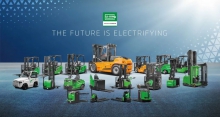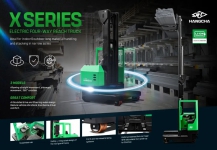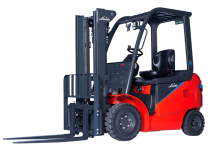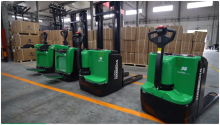This leading lift truck maker will broaden its materials handling offerings to help it compete in mature market...
This leading lift truck maker will broaden its materials handling offerings to help it compete in mature markets.
Only a few days ago, Toyota Material Handling, U.S.A. (TMHU) announced that Shankar Basu, its longtime president, was moving up to chairman and CEO, while Brett Wood, another long-timer as the company’s vice president of marketing, would be the new president. These moves are happening during a turbulent time in the U.S. economy, so Modern asked both of them how these changes would help protect their company and its loyal customers.
“Brett has worked within many departments at TMHU, so he can bring in the products the North American marketplace requires,” Basu answered. “Exciting products are coming such as hybrids and fuel cells. Also, in the spirit of kaizen, service to dealers and customers has to change. This means more service packages, and that will grow with Brett’s presidency.”
“There won’t be major changes in product and support,” Wood added. “In fact I’ll be listening to our customers, our partners and our factories so we can keep our ship heading in the right direction. We’ll develop strategic alliances and partnerships. We just launched a strategic alliance with PosiCharge, a fast charging company. Also, we have been building tow tractors in Japan for several years. Our business in the U.S. has picked up enough to justify local production at our factory in Columbus, IN.”
In fact, Basu said TMHU’s business is growing beyond industrial trucks to encompass many facets of materials handling.
“In the next five years as Brett’s presidency takes hold, he will move us toward being materials handling solution providers, which means racking, shelving and CAD/CAM design capabilities,” he continued. “My gut says those businesses will come 65% from alliances and the rest from things we’re not doing in the U.S. today but are being built by Toyota in Japan for the Japanese market. There is a racking and shelving company in Japan that Toyota partners with, and it may be feasible to bring that business here.”
Other long term plans include making more use of the synergy Toyota has been building with its sister company, the Raymond Corp., helping the Toyota dealer network stay profitable during these troubled economic times, and preparing as competitors from China establish a foothold with low-cost product in the U.S. market.
“We need to be prepared to handle that with high levels of service and value, and even develop a second level of product that meets them head on,” Basu concluded.
















 粤公网安备 44010602003952号
粤公网安备 44010602003952号